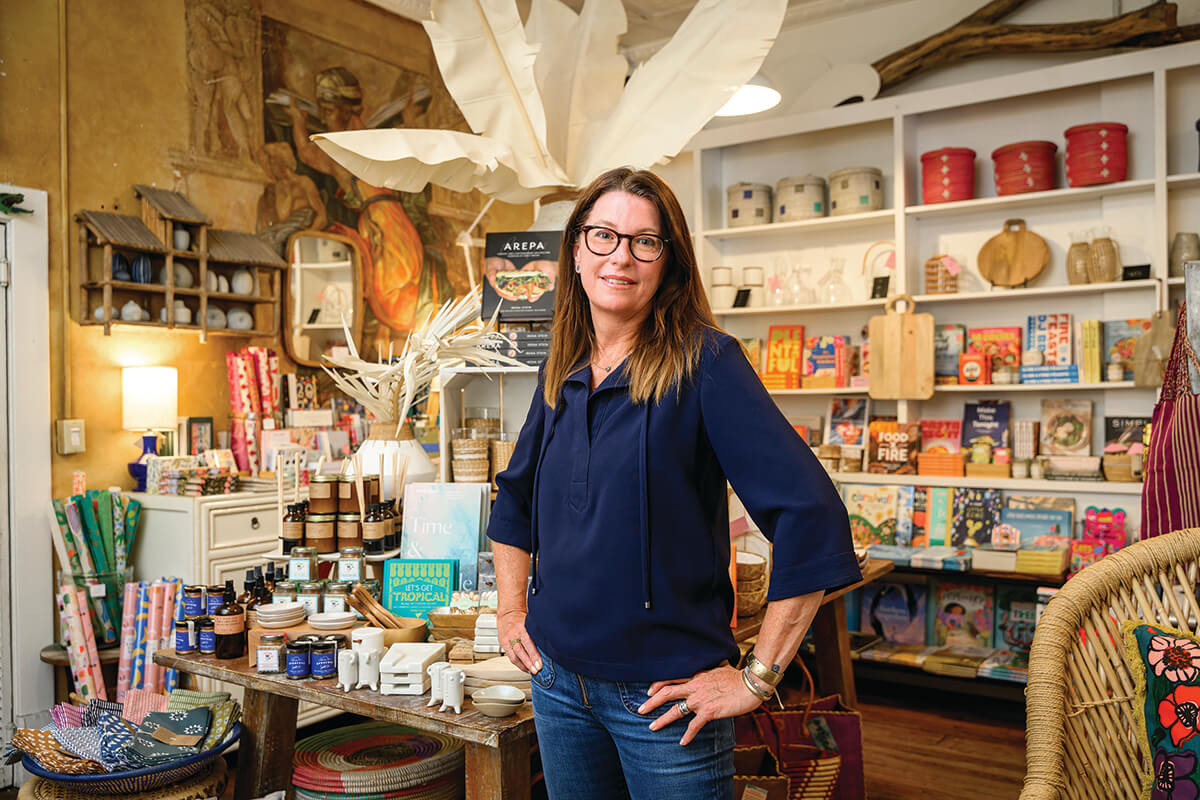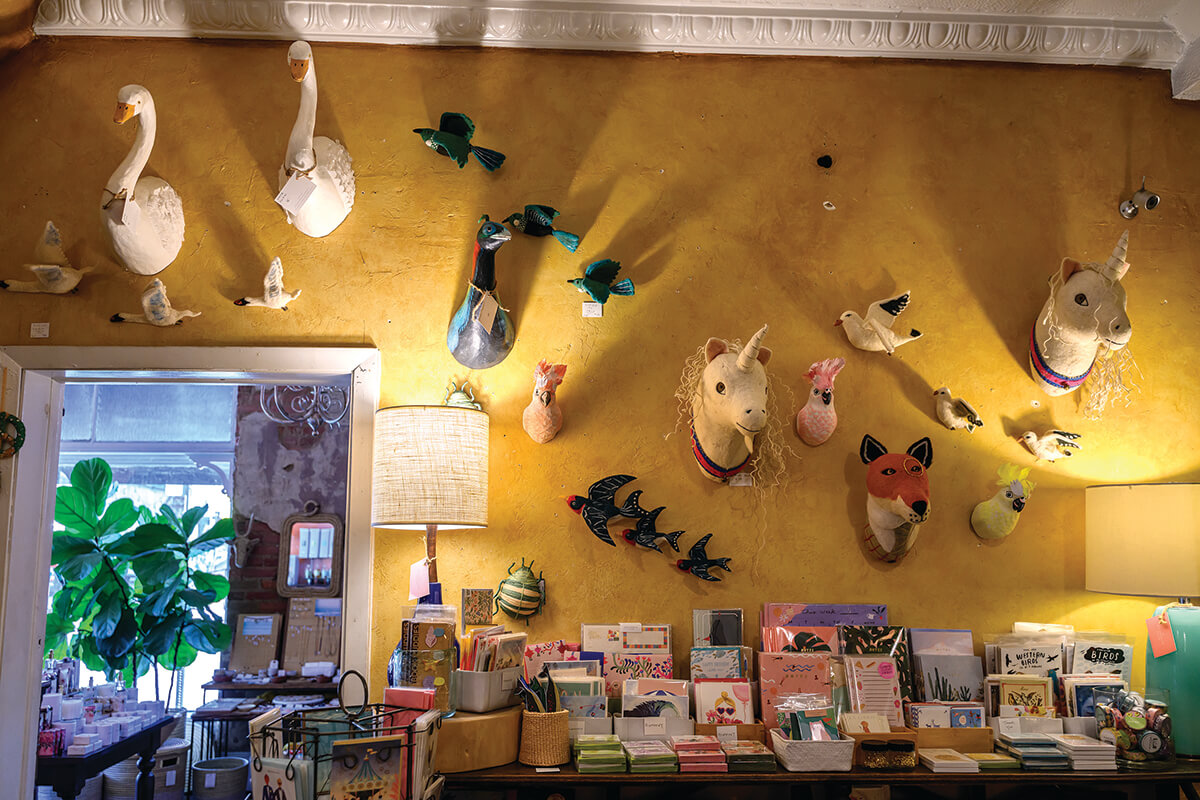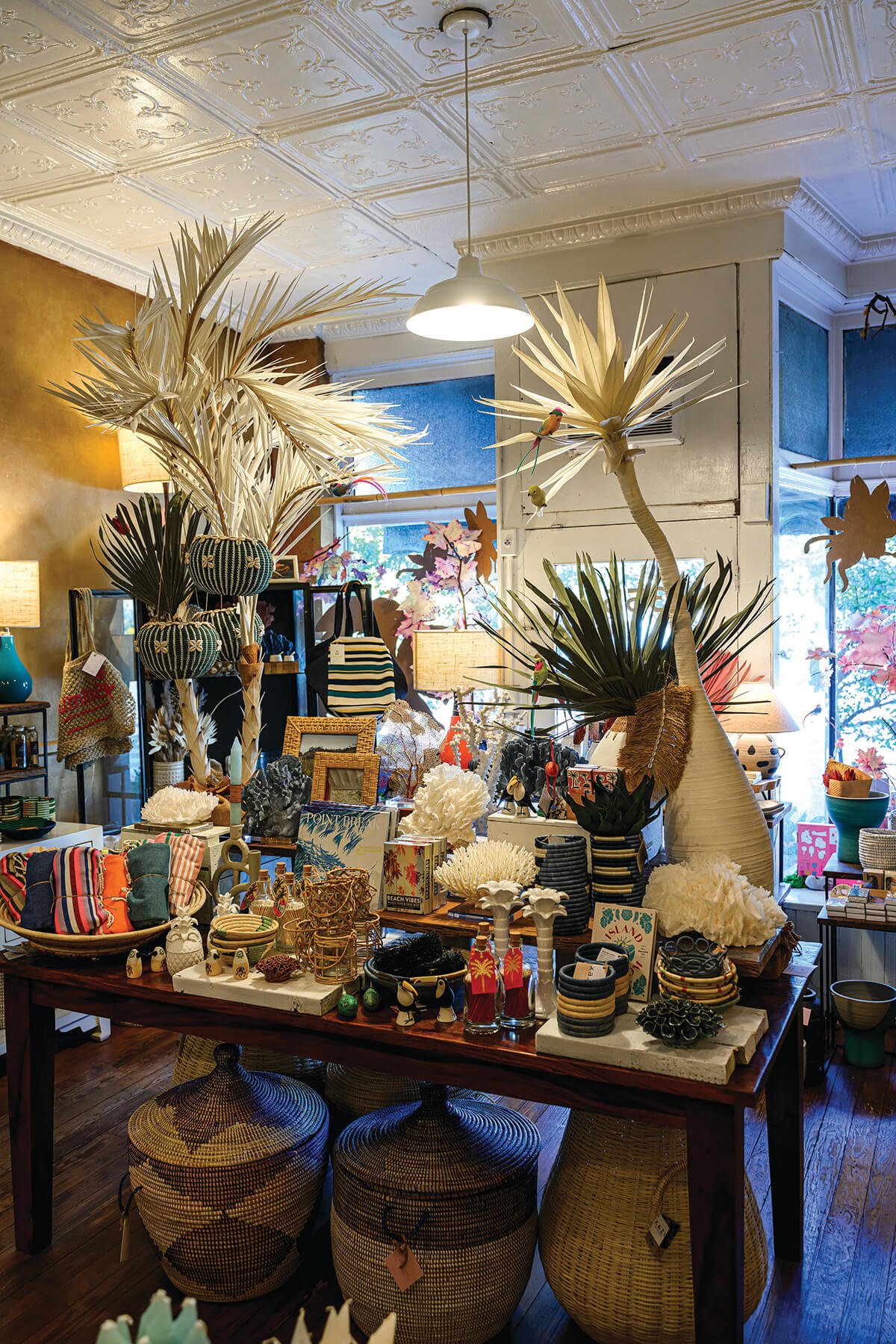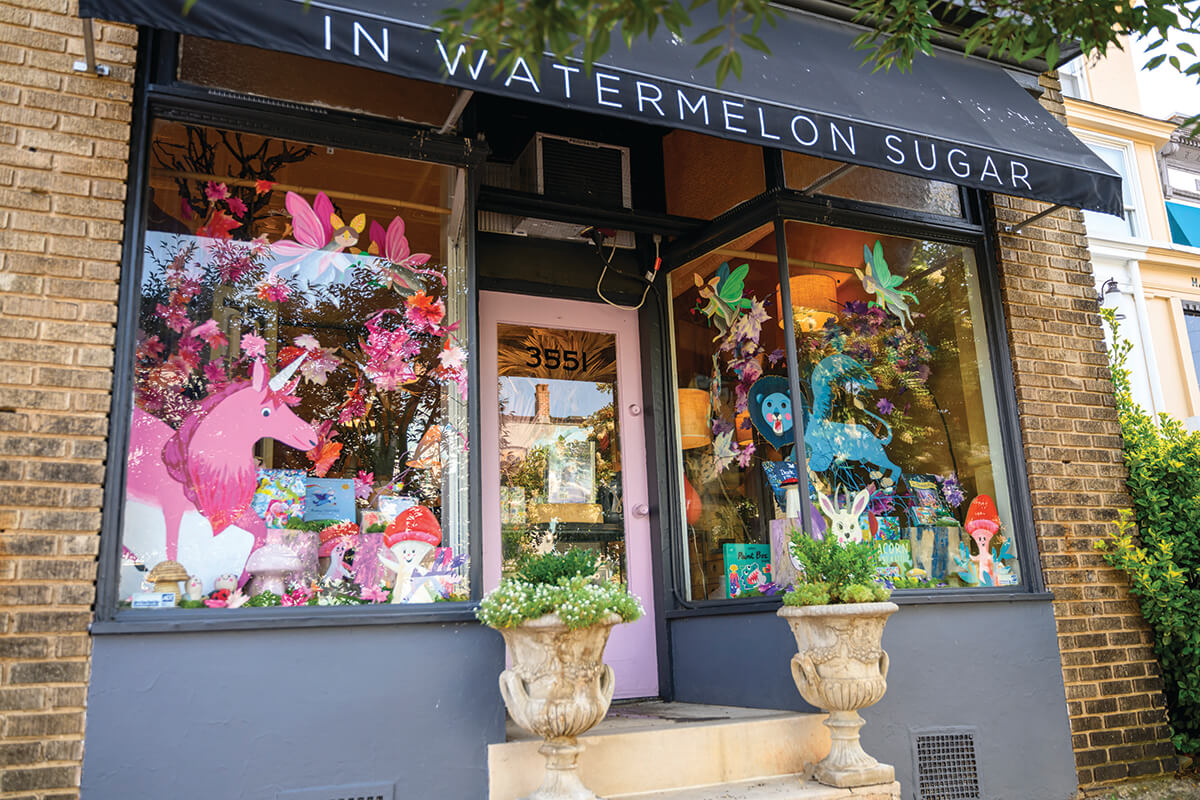Style & Shopping
In Watermelon Sugar Celebrates 25 Years on the Avenue in Hampden
Leslie Stevenson's magical corner shop was part of the first wave of businesses that turned the neighborhood into a shopping mecca—and it continues to be one of its biggest draws.

Leslie Stevenson, the doyenne of The Avenue, with her shiny shampoo-commercial hair, dimpled smile, and signature spectacles, opened her beloved shop, In Watermelon Sugar, at a friend’s nudge.
Stevenson’s pal was launching an Italian deli at the corner of Chestnut and 36th Street in Hampden but only wanted half the space. “Why don’t you open up a little home furnishings store,” she suggested.
And that’s really all it took.
“I signed a lease without knowing anything,” she says, laughing.
At the time, Stevenson, who grew up in Ruxton and graduated from the Maryland Institute College of Art, had worked at the Wine Merchant slinging sandwiches and at Dvorine Associates, a high-end design firm on Falls Road. “I’m sure my father was just absolutely ready to keel over and die because he knew I had no experience whatsoever.”
Nevertheless, she persisted and signed a lease. “I did everything backwards,” she says. “I did no research. I had no knowledge of business—I went to art school. I just knew what I liked. And what looked good together.”
Even when it came to the name for her new business, Stevenson was unruffled. “Not having had this lifelong dream to open a store, I had no thoughts on a name, so I was like, ‘Does anybody have a good name for me?’”
The crowdsourcing worked and a friend, who was a huge Richard Brautigan fan, suggested In Watermelon Sugar, Brautigan’s post-apocalyptic novel set in the aftermath of a fallen civilization. She thought it sounded colorful and wonderfully vague, since she still wasn’t quite sure what her store was going to sell. Her naivete most likely saved her from panicking.
“There were plenty of times where I feel like I probably should have seen the writing on the wall,” she says, referring to signs that the business might not be a success. “But I didn’t because I did not have that knowledge to know when to say when. So, I just kept plugging away.”
She emphasizes that she could never have done 25 years on her own. Stevenson gives all the credit to her support system—her husband, Bill Stevenson, the owner of Waverly Tattoo; their 16-year-old son, Xan, who grew up at the shop; and the people of Hampden, who have shopped in her store and welcomed her to the community. Everyone but herself.
“She’s so self-effacing, so chill,” says Libby Francis-Baxter, who owns the Modest Florist across the street and serves as the Hampden Village Merchants Association’s vice president. “She never takes credit for anything.”
But anyone who has stepped foot inside the magical corner shop, with its sunlight dancing across the wood floors, knows it’s all Stevenson. It’s clear in the store’s East-Coast-meets-West-Coast vibe, its perfectly placed displays, and even in that unmistakable scent—is she piping it through the air vents?—that smells like pure happiness (and a kiss of coconut). Her merchandise sits firmly between whimsical and practical. There are candles and cards, trinkets and baskets. Each nook holds books and room sprays, jewelry and lamps. There’s always a stack of seafoam-green or chocolate-brown tissue paper for wrapping gifts and her telltale pink sticker on each bag and box. And no matter how times you’ve walked through the shop—even just the day before—there is always something new to find.


“I think I was her first customer,” says Cameron Barry, who was working at the Mill Centre in 1998 and would pass by the shop every morning and afternoon. “I’m sure I just drove by and decided to check it out— and the rest is history.” She’s been a loyal shopper ever since. “I’ve never seen Leslie sit,” says Barry. But Stevenson never hovers either, allowing customers to peruse at their own pace. “She’s just incredibly warm and welcoming,” says Barry, “and has an interesting selection.”
Barry has story after story of Stevenson pointing her in the direction of other Hampden businesses instead of trying to force a sale. “Go next door,” she told Barry when she was looking for a mirror. When Barry told the folks at the Antique Exchange Stevenson had sent her, they said, “We love Leslie—she’s always sending people over here.”
Francis-Baxter isn’t surprised. She considers In Watermelon Sugar an “anchor institution” for Hampden—part of that first wave of businesses that turned the neighborhood into a shopping mecca and continues to be one of its biggest draws.
“She’s got an incredible eye—there’s no question. Anyone who has ever walked by her windows, you just stand there in awe,” says Francis-Baxter. But, she says, the windows are just an entry point into Stevenson’s world. “She’s really got the insight into those things that make you feel good and make you want to give good.”
The storefront windows on Chestnut weren’t always part of the equation. Remember those friends who encouraged her to open a shop next to their deli? In an ironic twist, they closed their business a year after Stevenson opened hers, and the landlord gave her the chance to take over the entire space. (“All the murals of the Sistine Chapel that are on the walls were left over from the Italian deli,” says Stevenson, clearing up something inquiring minds have often wondered.)
Initially Stevenson was hesitant, but her father insisted. He told her if she ever wanted to grow her business, which she would have to do in order to survive, she’d need room for more merchandise and storage. “I mean, none of this stuff entered my brain,” admits Stevenson. “So thankfully, it entered my father’s. He got me started on the right path—in every way.” They put a doorway between the two spaces, and it was a pivotal moment for the shop. She started selling less hand-painted flea market finds and more eclectic home goods. And she started to get a feel for who her customers were.
“Hampden is a unique area in the sense that you get so many different people,” she says. There are the college kids, folks from nearby Guilford and Homeland, tourists who find their way to The Avenue, plus a huge swath of regular customers that constantly come back, because they rely on Stevenson for certain staples. “Sometimes it’s hard, because you’re trying to accommodate all these people. But it’s also what’s great, because you have so many different types of people coming in.”
“IT’S HARD TO THINK OF ANYTHING ELSE OTHER THAN BEING GRATEFUL.”
Stevenson was 28 when she opened the store and now sits squarely in her 50s. “There’s a big difference between your mindsets. I don’t think you’re capable of absorbing the magnitude of time at that age. I don’t even think I had an idea when I opened the shop—how long am I going to be here? It just seemed like the next best move. Like, you live in the moment at that age, and everything is new and fun.” At that point, In Watermelon Sugar was her whole life. She’d work, close up, go out to bars, and rinse and repeat. There were no obligations other than making sure she was there the next day to turn the key.
Now she understands the weight of owning a business, having employees, paying bills, placing orders, and a new wrinkle: surviving during a pandemic. “There were times when I wished I had a boss, you know, someone to tell me what to do,” she says with a wry laugh. The freedom that came with owning a business—“I’m in control”—was also the burden that kept her up at night.
Other (fun) stresses include those beautiful seasonal windows where Stevenson really lets her creative juices flow. She realized early on she couldn’t put too much inventory inside the windows because the sun would bleach the goods, so instead she started creating displays with the product being almost secondary.
“It’s fun, but after 25 years it’s a little stressful only because I feel like I’ve done so many themes.” She starts rattling off previous fall windows—“I’ve done mushrooms, owls, woodland, farmers market, apple-picking, pumpkin patch… ” The shop’s basement is full of random items she’s collected for over two decades. Friends bring her rocks, branches, moss, and stumps for potential use in the window. And she’s caught the bug, too. She laughs. “I mean I can’t walk around outside without being like, ‘Ooh.’”

Indeed, on her frequent trips to California to visit her sister, she’ll often ship back boxes of rocks. Everyone is on the hunt. “Even my brother-in-law would be out surfing and find these crazy rocks and shells. And he’d box him up and send them to me for display. I know it’s ridiculous, but you open a business, and it just becomes all-consuming.”
But somehow Stevenson still makes it look effortless—like she’s almost embarrassed this milestone anniversary would cause any sort of fanfare. And in true Stevenson fashion, it’s her shoppers she’s focused on.
“It makes you reflect on your own life, when you see an anniversary for somebody that’s sort of big, because all of a sudden, you’re like, I’ve been going there for 25 years.” She’s watched customers have babies and now those babies are graduating high school or driving themselves over to shop for a girlfriend. “It’s a weird position that you don’t think of when you open something in your 20s. So, in your 50s, you reflect back. It’s hard to think of anything else other than being enormously grateful that you’re still there, and you’re able to witness this passage of time and see these people that you wouldn’t normally see unless you had a shop. It’s definitely wild.”
She also knows how lucky she is—especially during those darkest days of COVID-19. “I mean we lost Trohv,” she says solemnly. “And because we lost Trohv, I feel like I’m sort of reaping the benefits.” So that was sort of a bittersweet fluke. “[There are] a lot of variables that go into measuring success. And I think it’s not always [about] patting yourself on the back, thinking that you did the right thing.”
But when pressed, Stevenson says she does allow herself the occasional moment to soak it all in.
“I’m lucky to be in a neighborhood where I know so many people and they’ve kind of become a family. There’s a sense of ease that comes after 25 years. So, it’d be a shame to leave that now.”
For the foreseeable future, her plan is simply to keep showing up and turning the key.
“I’m grateful to have this to come to every day,” she says.